How to Clean a VHS Tape, and Avoiding Damage in Future
What to Do if Your Tapes are Damaged
The most important thing, by far, is not to play the tapes. Playing damaged tapes often makes the damage worse, and in some cases even damages your VCR. Repair your tapes (or have a professional do it for you) before you let them anywhere near your VCR. Diagnose the type of damage on your tape, and then proceed with the following methods.
Water Damage
When a home floods, the water will inevitably run into some of the most important items in the home. For example, the family VHS tapes. Often, the water submerges the tapes for a long time, due to local evacuations and general difficulty of maneuvering around the now flooded home. The water damages the video tapes if it’s in contact with them for long enough. The good news is that you may be able to recover your tapes.
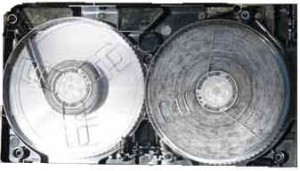
*Do not attempt to play a wet VHS tape! Doing so will more than likely damage both your tape and player beyond repair. Dry your tape out with the method outlined here before trying to play it.
If you know or suspect your VCR tapes have come into contact with water, it is crucial to retrieve them as soon as you safely can, and begin the drying process. The longer they stay underwater, more and more contaminants and deterioration can occur. If they’re in contact with water long enough, you might even begin to see fungal damage begin to occur.
If Your Tape is Still Wet
Once you retrieve your tapes, it’s best to quickly submerge them in a bucket of distilled water again. You need to get rid of any contaminants, and if the tapes are still wet, a quick soak in a bucket of distilled water isn’t going to hurt them. Sewage, chlorine, salt, and fungus all hurt the image and sound quality, so getting rid of them is advisable. However, if the tapes are already dried out, don’t soak them. Getting wet again will do more damage to your VHS tapes than any of the foreign contaminants could.
Drying Out Your Tape
You may be tempted to use a hair dryer, space heater, or radiator to dry out your tapes. Do not do that. Heat warps VHS tapes, and causes damage that really is irreversible. The appropriate method of drying them out is much slower then a hair dryer, but infinitely safer. The right way to dry the tapes out is to take the reels of tape out of the cassette and place them in a cool location out of sunlight that has a constant air flow. If you don’t know how to take apart your tape, check out our Tape Repair Guide. A large fan placed in the room will help with air circulation, and dehydrate the tape faster.
Mold Forming
If you don’t manage to get to your tapes quickly enough, mold is going to form on them. If this happens, do not play the tape. Even if you dry the tape, don’t play it. Mold will ruin your player as well as your tape. Most video transfer companies won’t digitize a moldy VHS tape. At DVD Your Memories, we instruct our technicians to never put a moldy tape in our VCRs. It is possible to reverse mold damage, though. More on that later.
Click here for more information on the causes and symptoms of video tape mold.
Heat Damage
Video tapes are actually fairly resilient when it comes to heat damage. You can even store them in an environment like a hot car or garage for a short period of time with no effect on the tape. But if you store the tapes in an unnaturally hot environment for an extended period of time, you are going to see visual and audial deterioration. But if the tape is exposed to extreme heat, like an open flame, you probably aren’t recovering it. As soon as the tape gets hot enough, the thin Mylar backing the tape warps and curls, and that damage can’t be reversed.
Honestly, the best practice is to just keep your tapes in a cool, dark place with low humidity. Heat and light make the tape decay much faster than cold and dark, and the moisture from humidity causes fungal damage to occur much more quickly.
Magnetic Damage
Magnetic tape damage is actually pretty common. VHS stores video and audio in the form of a magnetic strip. Your VCR reads these magnetic signals, and translates them to images and sound for your TV. While magnets write information to the tape, they also erase footage from tapes. When writing to a VHS tape, magnets leave tiny imprints on the surface that a VCR can translate into sound and audio. So it follows that a magnet can damage your VHS tape beyond repair by altering those tiny imprints. For a more technical explanation of how data on a VHS tape works, check out this article.
The short and long of it is that magnetic damage will damage your tape beyond repair. It literally erases the data off, or alters the data on your tape. Keep your tapes away from anything magnetic.
Physical Damage
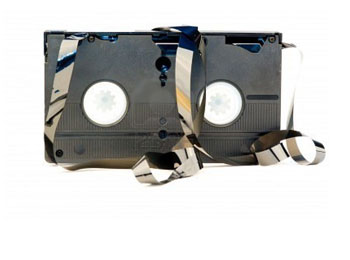
At DVD Your Memories, we have a tape repair service. By far the most common type of damage we end up repairing is physical damage. We see everything from snapped tape, to broken shell casing, and everything in between. In these cases, generally the “guts” of the tape are all fine, they just need to be replaced in a new shell or re-spliced together. If you want to repair it yourself, here’s a guide. If you want us to repair it for you, we have locations in Los Angeles, Orange County, San Diego, and the South Bay.
Fungal Damage
We recommend using a professional service. DIY methods here are dangerous, and you’re more likely to infect your VCR with mold and inhale a bunch of mold spores than actually clean your tape. The safest action, by far, to salvage those memories is to pay a professional to do it for you. DVD Your Memories doesn’t repair fungal damage, but Image Recapture do a great job.
If you’re looking to repair your own tapes, the video below details all of the steps.




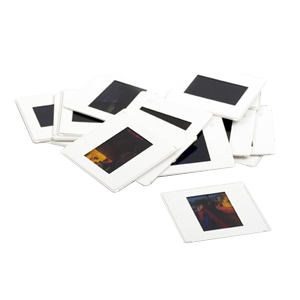

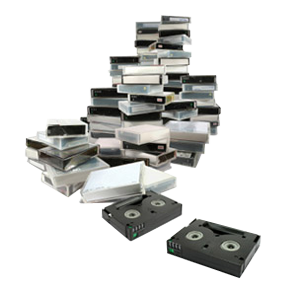
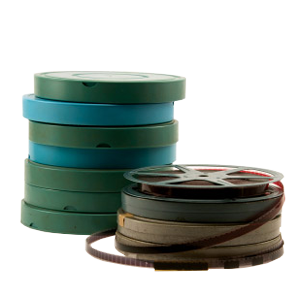
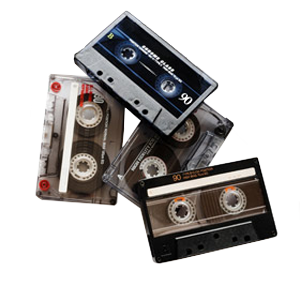

Hi, I’m wondering at what kind of temperatures you start to get image and audio degradation without physically damaging the tape? Also what are the symptoms of magnetic damage?